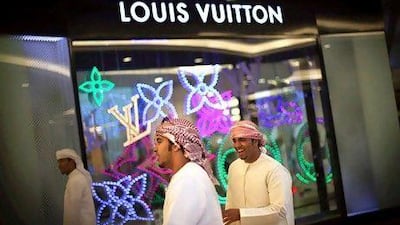One of the Middle East's biggest luxury retailers has recorded a huge increase in sales driven by public-sector pay rises across the region.
The Chalhoub Group said it netted sales growth of 35 per cent last year - driven by a high-end spending spree in Saudi Arabia, the UAE and Qatar.
Partnerships with global brands such as Chanel, Fendi and Saks Fifth Avenue, helped the retail, distribution and marketing conglomerate to achieve its best profits ever last year.
Patrick Chalhoub, the co-chief executive of the company, said sales were boosted by a huge redistribution of wealth in Gulf countries, amid the Arab Spring.
"There has been a willingness to distribute wealth stronger and quicker. This has put more disposable income in the hands of the people," he said. "Part of [the growth in retail sales] was due to the general economy but part was also strong fundamentals in our business."
The privately owned company does not disclose earnings.
Governments across the Gulf, particularly in Saudi Arabia and the UAE, have stimulated their economies with huge investments in infrastructure and direct hand-outs to their citizens.
Last month, Sheikh Khalifa, President of the UAE, ordered increases in the salaries of all Emirati federal Government employees by 35 per cent to mark the UAE's 40th birthday.
Mr Chalhoub said sales had also benefited from a high oil price, the growing Middle East population and the huge numbers of tourists who visited the UAE rather than travel to destinations affected by civil unrest. "We are in countries where the birth rate is high and there are more and more people reaching maturity age, and so our customer base is increasing," said Mr Chalhoub.
Abu Dhabi expects 2 million visitors will have stayed in its hotels last year - a record for the capital. In Dubai, the number of hotel guests increased by 11 per cent in the first three quarters of the year compared with the same period in 2010, according to figures from the Department of Tourism and Commerce Marketing. The influx buoyed retail sales across the country.
Globally, luxury retailers have also had a bumper year, in stark contrast to their down-market peers hurt by a slowdown in consumer spending that has forced some into bankruptcy.
In the UK, the major chains Halfords, the Argos-owner Home Retail Group, Mothercare and Thorntons reported a difficult festive period. La Senza, a lingerie chain, entered bankruptcy proceedings and was bought last week by the Middle Eastern retailer Alshaya.
Bain & Co, a consultancy, had estimated luxury goods sales would grow 8 per cent last year, helped by increasing levels of wealth in China, but Mr Chalhoub said he expected that figure to be higher in the Middle East.
"When you are spending on luxury, you spend on aspirational products and you not only have to have the buying power, you must have the mindset that is positive to spend," he said.
"In 2011 we had people who had the peace of mind and were looking at things more optimistically."
High-end retailers such as his will be hoping such sentiment extends through this year. Last week Tiffany, the world's second-largest luxury jewellery retailer, lowered its earnings forecast in a move that sent other luxury stocks tumbling and was the first indication of caution in the sector where sales had surged for the past two years.
The Chalhoub Group has 280 prestige brands, including joint ventures with Christian Dior and Louis Vuitton.
The group is made up of more than 60 companies and has a presence in 14 countries across the Middle East. It has more than 7,300 employees, with about a third of those based in Dubai.
Mr Chalhoub estimated that via the group's fashion and beauty brands it had a 20 per cent market share across the Middle East in the luxury sector.

